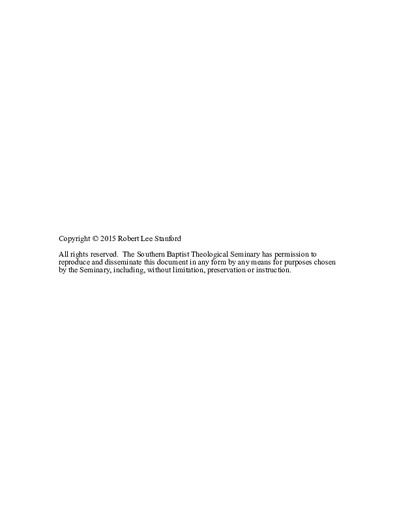The Ecclesiological Grounding of Pauline Language of Leadership in 1 and 2 Timothy
Subject
Bible. Timothy, 1st--Criticism, interpretation, etc.Church
Christian leadership--Biblical teaching
Abstract
ABSTRACT THE ECCLESIOLOGICAL GROUNDING OF PAULINE LANGUAGE OF LEADERSHIP IN 1 AND 2 TIMOTHY
Robert Lee Stanford, Ph.D. The Southern Baptist Theological Seminary, 2015 Chair: Dr. Hal K. Pettegrew
The purpose of this textually-based research was to establish the thesis that there is a discernible language of leadership utilized by the apostle Paul in 1 and 2 Timothy, born out of his ecclesiological purposes. This thesis investigated Paul’s leadership from the perspective of his leader-speak. A working premise was that leaders lead through communication of concepts and ideas, with the goal of influencing and persuading followers. To that end, leadership was defined as the effort to influence others to accomplish a collective goal through the development of relationships, actions, and words, which stimulate the attendant actions of those being led, in order to effect the desired response of a shared achievement. Similarly Paul’s leader-speak was defined, in part, as that which was communicated, to some degree, through the rhetorical teaching of his day and empowered and utilized by the holy spirit. The thesis measured against the discoveries offered a biblical base, 1 Timothy 3:15, for the theological context and purpose that informs Paul’s language of leadership. Paul’s ecclesiological purpose is that the church, the pillar and support of truth, must protect and promote the gospel. To that end, Paul’s leader-speak is concerned about orthodoxy as well as orthopraxy. Such leader-speak issues from Paul’s mouth to Timothy in a variety of voices including that of a father, teacher, and example. A parental perspective is apparent in the
conversational framing and vocabulary Paul utilizes, as well as the tenor of his words. Paul speaks as a teacher in the employment of metaphorical illustrations, preformed materials and rhetorical strategies. Paul’s leader-speak is often the rhetoric of example: godly behavior in suffering. Such implicit language of example is often that of influence and persuasion, as well as contrast. At other times, Paul is explicitly direct in his leader-speak. The thesis of a Pauline language of leadership grounded in an ecclesiological purpose appears to be a valuable proposition. Thus, some implications and applications of these conclusions were discussed.

